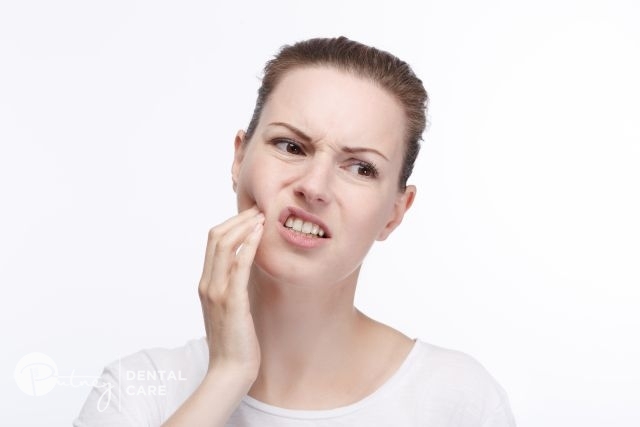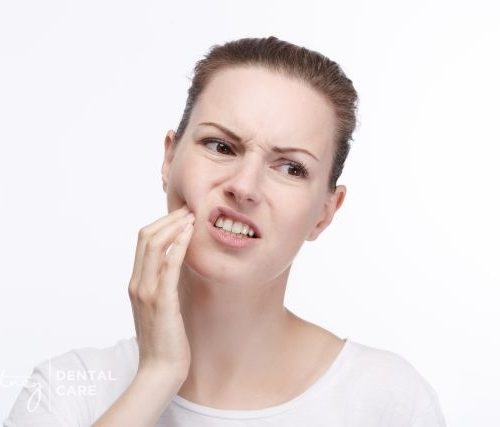Bruxism And TMJ; What Is The Difference?

From time to time it is normal to have unexplained pain in your teeth and gums, but if it is a regular occurrence night after night, you might need to speak to your dentist. Thousands of people around the world suffer from grinding their teeth or clenching their jaw when they are asleep, which can cause many problems if it is left untreated.
Bruxism
Bruxism is the medical term given to the act of grinding or clenching your teeth together. There are two different types of bruxism that people can experience; sleep bruxism and awake bruxism. Many people who have sleep bruxism are not aware that they have the condition because they are always unconscious when they are doing it. However, people who have awake bruxism may be more aware of their issue and use it as a coping mechanism.
Teeth Grinding In Children
Dentists can notice the signs of teeth grinding or clenching, even if you are not aware of it yourself. However, if you have a child, it is important to keep an eye on them if you suspect they have this condition and let their dentist know to get ahead of the problem before it takes hold. Although it is common for young children to grind their teeth, they usually stop doing it after a while, so you shouldn’t be too worried if your child starts to grind or clench their teeth.
What Causes Bruxism?
It is unknown what causes bruxism, but it is thought that there is a genetic component to the condition, so if you have a history of this condition in our family you may be more likely to develop this habit. Also, people who are on certain medications such as antidepressants are often prone to grinding their teeth, as are people with certain health conditions such as Parkinson’s, GERD, ADHD and sleep disorders.
Symptoms of Bruxism
There are many symptoms of bruxism that you can identify yourself before you see a dentist. Some of these include;
- Disrupted sleep
- Scars or damage in the side of your cheek
- Noise – can wake up your partner while sleeping when you grind your teeth too loud
- Teeth are flattened, fractured, chipped and loose
- Headaches – pain in temples
- Earaches- even though you do not have ear issues like an infection or pain
- Worn enamel of your teeth
- Soreness or pain in your jaw or neck
- Sensitive teeth
- Pain in teeth
- Lockjaw
- Tiredness or tightness in the jaw area
- Struggle to close your jaw
Temporomandibular joint dysfunction (TMJD)
If you have TMDJ, your Temporomandibular joint which acts like a sliding hinge that connects your jaw to your skull will have something wrong with it that causes it to stop functioning correctly. This condition can cause a lot of pain to those who have it and it will build up over time, getting worse the longer it is left untreated. You may also lose control of your jaw as the condition progresses, which can make it hard for you to do anything with your mouth because of the pain.
What Causes TMJD?
As with bruxism, it is hard to determine the cause of TMJD, but genetics can play a big factor in inheriting this condition. Also, people who have preexisting conditions like arthritis, or jaw or neck problems may be more likely to develop TMJD. Pain from TMJD can often be managed if your dentist catches on early with non-surgical treatments and pain management solutions. However, if the problem progresses, surgery may be your only option, so it is important to intervene before the problem takes hold.
Symptoms of TMJD
There are many symptoms of TMJD that you can identify yourself before you see a dentist. Some of these include;
- Locking of the jaw
- Finding it hard to fully close jaw
- Jaw pain or tenderness
- Pain in one or both temporomandibular joint
- Aching facial pain
- Pain around ear
- Difficulty or pain when chewing
What should you do if you have these issues?
Bruxism and TMJD are very similar conditions, but the real difference is that bruxism involves the grinding or clenching of your teeth, where TMJD is related to the dysfunction of the jaw and the muscles that control jaw movement. So, you can have TMJD that may be caused by Bruxism, and you can also have Bruxism which causes TMJD, so the two conditions can often affect the same person.
If you suspect that you or your child has one of these conditions, you should book an appointment with your oral care specialist. They will be able to perform an examination and determine how severe your condition is, and how to proceed with treatments for your condition. Call (02) 9808 2588 for more details now. In the area? Drop by our dental care West Ryde facility to schedule an appointment or come in for a checkup.
6 Ways to Help Bad Breath 5 Dental Problems That Can Be Avoided With Regular Check-UpsLatest from the Dental Blog
 07 Aug 2020
07 Aug 2020
Bruxism And TMJ; What Is The Difference?
From time to time it is normal to have unexplained pain in your teeth and gums, but if it is…
 05 Apr 2017
05 Apr 2017
Protect your teeth against cavities this Easter holiday
When was the last time you really brushed your teeth? Do you have a diet high in sugar and starches?…
 15 Sep 2022
15 Sep 2022
Why Do I Have Itchy Gums? Causes and Treatments
Our mouth is lined with two rows of teeth that help us bite, chew, and digest our food. Gums, also…
